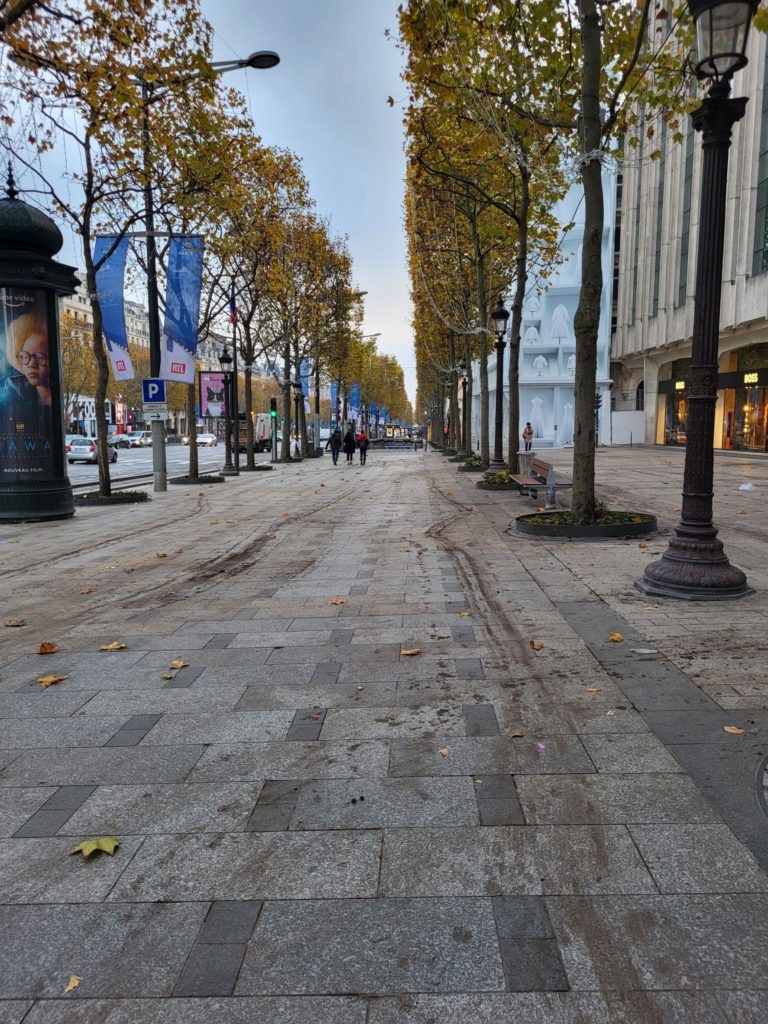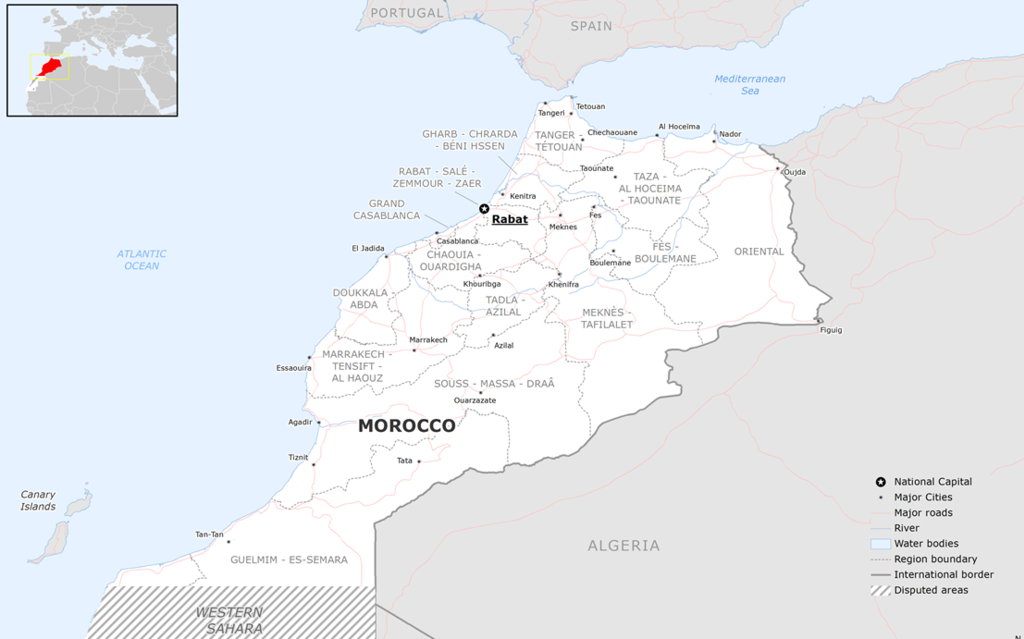In Paris, celebrations, demonstrations and riots tend to take place on the Champs-Elysées — but usually not all at once. Saturday was an exception.
The excitement began in early evening, after Morocco defeated soccer powerhouse Portugal 1-0 to qualify for the semifinals of the World Cup in Qatar. Thousands of people, mostly of Moroccan background, poured onto the world’s most famous avenue to show their delight. Many of them were still there four hours later, after France defeated England 2-1 to secure its own place in the bracket and its fans rushed to the Champs-Elysées as well.
Timing wasn’t the only connection: The teams’ next match will be against each other. The former colonial power and its ex-protectorate will play Wednesday at 8 p.m. Paris time to determine who goes to the finals against either Croatia or Argentina.
The scene on the Champs reflected what often happens when big crowds gather there: a combination of joy and conflict.
There were displays of unity:
La 🇫🇷 et le 🇲🇦 en communion sur les Champs-Elysées. La France que j’aime. #ENGFRA pic.twitter.com/ooRklmr3oe
— Théo Pasquereau (@theopasquereau) December 10, 2022
“France and Morocco (represented by flags) in communion on the Champs- Elysées. The France that I love.”
«C’est dur : il y a le pays de nos parents, et le pays qui nous a tout donné ! On est à Paris, c’est notre ville, la France c’est chez nous, on va tout donner et que le meilleur gagne !», confie un supporter franco-marocain sur les Champs-Élysées dans #SoirInfoWE pic.twitter.com/8nPxDBD9ne
— CNEWS (@CNEWS) December 10, 2022
“It’s tough. There’s the country of our parents, and the country that gave us everything. We’re in Paris, it’s our city, France is our home, we’ll give everything and may the best country win!”
And of course, there was the other type of event seen on the Champs: Riots.
Des supporters marocains lancent des poteaux et projectiles sur les policiers français aux #ChampsElysees. #FraMar #ENGFRA #MARPOR pic.twitter.com/Uny0l79oVP
— Damien Rieu (@DamienRieu) December 10, 2022
“Moroccan fans throw poles and projectiles at the French police on the #ChampsElysees.”
(Note that there is no proof of who was throwing or that most people of Moroccan background here are also French.)
It was garden-variety violence, despite what some of the right-wing TV commentators were saying. The Yellow Vest anti-tax protests in 2018 and 2019 were a lot worse.
By Sunday morning all was back to normal, give or take some tire marks (probably from cleaning vehicles).

For both teams, reaching the semifinal round is heady stuff. France won the Cup in 2018 and thus has a chance to be the first country since Brazil in 1962 to earn back-to-back trophies. Morocco, for its part, is the first African and the first Arab nation ever to reach the semifinals.
The two countries have a complex relationship, though perhaps not as much as France’s with Algeria, its North African neighbor. France took control of Morocco in 1912 after several years of nibbling around the edges, and gave up the protectorate in 1956. French is widely spoken, and many Moroccans immigrated in the 1960s to work in France’s then-booming factories. Their children are, of course, French, though the political right wing often ignores that.
Relations between the two countries are at a low ebb: France has recently restricted visas for Moroccan visitors, and Morocco is offended at France’s courtship of natural-gas producer and neighbor Algeria. President Emmanuel Macron is expected to visit next spring to try to smooth things over. He will also attend Wednesday’s game; the King of Morocco hasn’t said whether he’s coming.

JRC (ECHO, EC) Via Wikimedia Commons
To view the France-Morocco soccer match as a bilateral rivalry is misleading, though. Both teams are incredibly international and multiethnic. More than half of the members of Morocco’s team, called the Atlas Lions, were born in other countries, including France, and 18 of the 26 players play professionally in Europe, some for high-level teams.
On the French team, Les Bleus, 15 players by my count are first or second-generation immigrants.
“Through their successes, the nation’s athletes offer a positive vision of how diversity is a strength for the team, and by extension for France — in the process nourishing new ways of thinking about what the nation is and can be,” Laurent Dubois, a professor at the University of Virginia, wrote in the New York Times.
Many players were recruited and sent into France’s training system from the grim suburbs of Paris, known as the banlieue, which has produced some of the country’s top talents. They or their families came from Congo, the Philippines, Cameroon, Ivory Coast, Mali, Senegal and, in one case, Morocco.
“They have `la niaque,’” said my physical therapist, a Belgian former rugby player who also grew up in a difficult neighborhood. The term is so slang that the spelling can vary, but it means a combative hunger to win.
No one embodies multiethnicity and la niaque more than Kylian Mbappé, France’s star and one of the best players in the world, who grew up in the Paris suburb of Bondy. He has a Cameroonian father and an Algerian mother, both former competitive athletes.
Mbappé plays professionally for the Paris Saint-Germain club. So, as it happens, does Achraf Hakimi, a defensive star for the Moroccan national team who was raised in a village in Spain, where his mother cleaned houses and his father was a street vendor.
The two friends can’t wait for Wednesday’s match.
See you soon my Friend ❤️🤝🏽 @KMbappe
— Achraf Hakimi (@AchrafHakimi) December 10, 2022
🇲🇦👑🫶🏽… @AchrafHakimi pic.twitter.com/fDCyfMI7LM
— Kylian Mbappé (@KMbappe) December 6, 2022
Beautiful piece of reporting. ESPN should pick it up.
Saul
Many thanks! Note to self: Get to know people at ESPN.
Thank you, neighbor, for an insightful article on French post-coloniality as it is played out in sports, whether on the field or on the Champs-Elysees!
I’m so glad you enjoyed it! Coming from you I feel most flattered.
Great article, Anne. Really enjoyed reading it. HK
Thanks, Hilary!